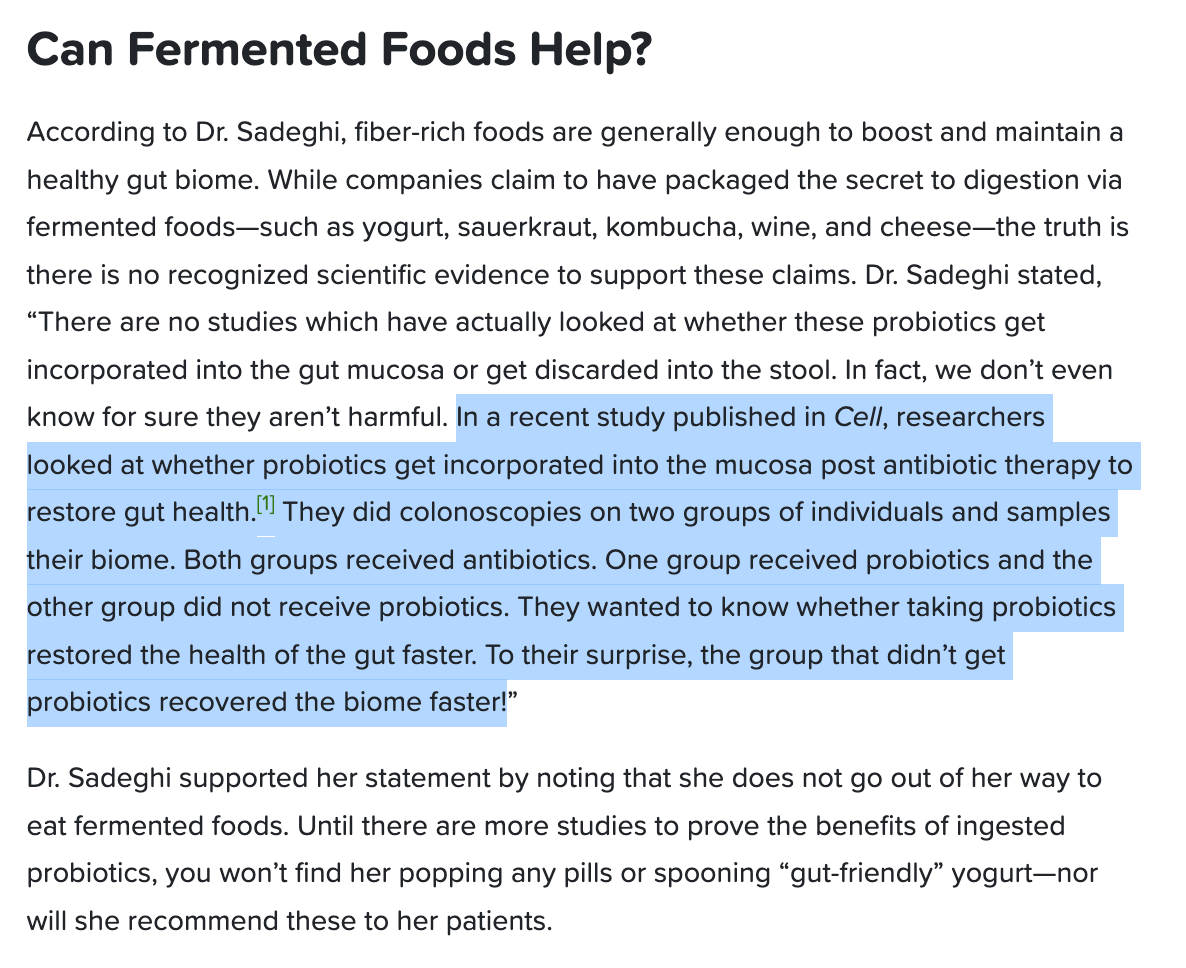Are probiotics risk free? A lecture presentation by Dr Sean Spencer (Physician Scientist at Stanford) sheds some light:
The observations on microbiome recovery & immunotherapy for melanoma are surprising — can probiotics impair our microbiome and immune system?
49:44 (Overview) Probiotics May Be Associated with Risk
51:39 Antibiotics & Microbiome Recovery with & without Probiotics
54:29 Probiotics & Immunotherapy for Melanoma
56:25 Dr Sean Spencer's recommendations for Prebiotics, Probiotics, Post-biotics & Synbiotics.
59:21 next topic
An interview with Dr Sean Spencer by Viva Longevity.
At offset 1:52, Dr Barnard is asked, "What is Dr Barnard's opinion on probiotics, either supplements or through fermented veggies such as sauerkraut or kimchi?"
Dr Barnard's reply, "Don't waste your time." He cites a study in which people who had taken antibiotics were divided into two groups; those who took probiotics "did not replenish their gut bacteria as well as people who just let nature take its course."
Dr Angie Sadeghi says:
This is an excellent interview. Insightful. At offset 25:32, Dr Sadeghi explains why she's not a fan of probiotics, citing this research paper in Cell (2018).
Also see this FaceBook post by DR Danielle Belardo. Excerpt:
At offset 14:33 of this video, Dr Alan Desmond (WFPB gastroenterologist from UK) explains that prebiotics (eating a variety of plants in their whole form) is far more effective than probiotics. Our focus should be on prebiotics. In other words, diversity of plants: whole grains, beans, fruits, veggies, nuts & seeds, herbs & spices.
Probiotics Principles (updated 2017) by Dr Klaper
Dr Klaper mentions that his own views on probiotics changed during his career as a physician. He now concurs with other docs like Dr Greger and Dr Bulsiewicz that prebiotics ((basically fiber-rich & resistant-starch rich foods) are far more important than probiotics.
Articles by Dr Greger:
- (2012) What is a good source of probiotics?
- (2021) Presumed Safety of Probiotics Questioned
- (2013) Probiotics & Diarrhea
- (2013) Probiotics During Cold Season?
- (2014) How Probiotics Affect Mental Health
- (2014) How Should I Take Probiotics?
Videos by Dr Greger:
(1 min) Transcript.
(2 mins) Transcript.
(6 mins) Transcript.
(5 mins) Transcript. Dr Greger's summary: "In certain medical conditions, probiotic supplements may actually make things worse."
(4 mins) Transcript. Dr Greger's summary: "Probiotics may help prevent antibiotic-associated diarrhea, and appear to speed recovery from acute gastroenteritis."
(4 mins) Transcript. Dr Greger's summary: "Though prebiotics may be preferable, probiotics may reduce the risk of upper respiratory tract infections."
(2 mins) Transcript. Dr Greger's summary: "Proper timing of probiotic supplements may improve their survival."
(5 mins) Transcript. Dr Greger's summary: "We've known our mental state can affect our gut flora, but might our good bacteria be affecting our mental state?"
(2005) Beneficial Bowel Bacteria — Our Neglected Friends has an interesting section:
Dr McDougall has a 43-min presentation: Marketing Milk and Disease (2012) explaining why he doesn't recommend dairy products.
See Prebiotics

 Instagram
Instagram YouTube
YouTube